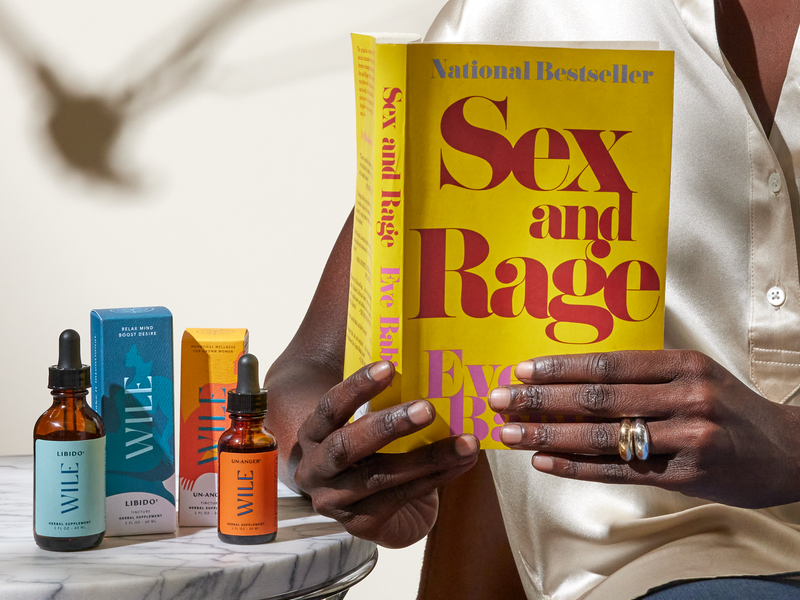Barbie Boules, the Cognition Dietitian is a metabolic and cognitive health expert for women over 40, as well as a meditation teacher. With 22 years of experience beginning as a registered dietitian, she’s one of our favorite follows for thoughtful, actionable tips—and we have many in this conversation! This was edited for length and clarity based on our IG live interview.
Wile: What does metabolic health mean?
The Cognition Dietitian: Most of the time, when people hear the word metabolism or metabolic they think of their metabolic rate, which is the number of calories that we burn or energy that we burn in a given 24
There are 4 pillars of metabolic health:
- blood pressure
- blood sugar
- blood lipids, so HDL, LDL cholesterol, and triglycerides
- body composition.
The good news about all of that is, there's really only one strategy that hits everything. I mean, there are little tweaks and things for cholesterol, and then blood sugar. But if you're doing good things, you're hitting it all. And I always say, if you're focused on your brain, you're taking care of the rest of your body. So that's why I focus on brain health, because that really covers all of
Wile: Love that way of looking at it. Usually, we worry about how we look, but don’t really think about the impacts. The unique gift of getting a little bit older is we start to focus internally a bit more as well, on longevity and health as well as optics.
The Cognition Dietitian: And if you are taking care of your brain, you improve your body composition, too. So it takes care of everything, but you're working from the inside out.
Wile: So where do we start to take care of our brains?
The Cognition Dietitian: I'm always approaching things through what I call the four pillars of optimal health, and each are equally important:
- nutrition
- sleep
- exercise
- managing stress.
Each is equally important but there is one thing that every expert on the planet agrees upon when it comes to better brain health: Exercise.
There's so much you can do in terms of nutrition, but there is some disagreement about exactly what to do. When it comes to exercise, everybody's on board.
For those who haven't exercised in years, or it's just never been their thing, just start.
Make an appointment with yourself every single day. It can be a five minute appointment, but you're training your brain to be somewhere at a certain time.
It can be in your living room, it can be your basement, or the gym. Just schedule that consistent, intentional exercise time. And then you can make it 10 and 15 and 30 minutes.
Wile: How much exercise do we need?
The Cognition Dietician:
In a perfect world, we're all doing:
30 minutes of cardiovascular activity a day, enough to raise your heartrate to about 70-80% of your max heart rate.
And 70 minutes of strength training a week.
So it's about 40 minutes a day-ish. But if that's not achievable for you, start with five minutes, whatever you can do. Consistently.
Walking is actually excellent for your brain. So if that's what you'll do consistently, do it. As our bodies start changing and we have new needs, it's important to be intuitive about what feels right to you. Because that's what you'll continue to do.
Wile: What does exercise do for the brain?
The Cognition Dietician:
Exercise helps the brain in multiple ways. Number one, it increases blood flow, particularly cardiovascular exercise.
When you're increasing blood flow, you're bringing more oxygen, you're bringing more nutrients, it also increases something called BDNF or brain derived neurotrophic factor, which like Miracle-Gro fertilizer for the brain.
So exercise helps both structurally, so the actual brain tissue, and then also chemically in terms of reactions that happen, basically, it's stimulation, and that is what your brain requires.
Think of your brain as a muscle as well. Using it, challenging it, is important.
Wile: And what about nutrition for our brains?
Cognition Dietician:
There are so many ways to approach it, but the #1 thing people agree on is eating leafy greens. And omega-3s. They are equally important.
One easy change is add 1 cup of leafy greens a cup a day. People in a research study that was done at Rush University of Chicago in 2015. People who ate leafy greens every day, their brains performed 11 years younger than their cohorts who did not. So this is really significant the spectrum of nutrients that are included in leafy greens
Obviously, the more the better but a cup is great. And there’s no difference between cooked and raw.
Wile: Any other nutritional changes we should make for our brains?
The Cognition Dietician:
So I know people don't like to hear this, but alcohol. It really is a neurotoxin. It's also a toxin that's toxic to just about every cell. There’s some amount you can get away with, but if you’re really concerned about the health of your brain, minimizing alcohol is number one.
And minimize refined starches and sugars. Again, small quantities are not a big deal. We do not want the build of a diet made up of ultra processed foods—anything in boxes, bags or fast food.
Avoid ultra processed foods.
Wile: What’s your take on seed oils?
The Cognition Dietitian:
This is such a hot potato. Despite what you might see out there, there is no good, solid research that indicates that seed oils in and of themselves, including canola, including corn are problematic to health.
Wile: Anything else?
Cognition Dietician:
Never stop learning. Always be challenging your brain whether that's, you know, hopefully it's enjoyable, you know, something like learning a new language or traveling without a GPS or, you know, challenging your brain to think and not just being on autopilot, which is unfortunately how a lot of us live right now.
Wile: So often, we read articles filled with the perfect morning routine, or impossibly ambitious wellness ideas that don’t fit into real life. What are other changes that are doable, so we feel successful, and can build momentum for healthier habits?
Cognition Dietitian:
If stress is an issue for you, stress relief has to be addressed first. Stress will get in the way of trying to cook your own meals or even grocery shopping or you know getting better sleep or finding the time to exercise. So the stress piece needs to be addressed.
If all you're ever doing is going, going, going doing, doing, doing and for it's all for everybody else, all your energy is going out of you, instead of coming back into you. You're going to be exhausted and burnout.
Wile: Stress is so normalized. Women are expected to do more, take on more, get through it. Especially in midlife with all the competing pressures. Where do we start for stress management?
The Cognition Dietician:
The first step is, reclaiming our time. Start with five minutes a day of time just for you, directing the energy at you. It can be any time of day, whenever it's going to make the most sense. Make this appointment with yourself.
I have clients that started by setting a timer for 2 minutes - 120 seconds - because that’s all they could do. Now they’ve built up to an hour. And it changes their physical, mental and emotional energy completely.
Wile: What do we do in that 2 minutes for stress relief?
The Cognition Dietician:
Initially, you can do nothing. It's really hard to do nothing. But you can sit on a couch and stare at a wall, you can read a couple pages in a book, you can sip some tea outside, whatever. Just connect to yourself.
Yeah, and Wile has some great products for stress relief, by the way, I really enjoy Burnout Relief, the Women’s Stress capsules and the Calm & Collected drink mix.
Wile: We are big believers in stress relief because it really does impact midlife women. What are some health impacts of stress we may not know about?
The Cognition Dietitian:
Chronic stress actually shrinks your brain, it actually causes brain atrophy. So it is absolutely a risk factor for dementia to be chronically stressed. That is, it is terrifying, because, as you said, stress is so normalized survival mode is how a lot of us live. And it's so normal, we don't really know it until we've had a moment.
Wile: Dare we ask, does your brain grow back, if one reduces stress?
The Cognition Dietitian:
It's not that it grows back necessarily, but it can start functioning better. Once unfortunately, and this is part of the problem with neurodegenerative disease, once the brain cells start to die, they really don't regenerate. Although in the hippocampus, there is some neuro-regeneration, but it's not like it just spreads back. So that's why we really need to protect our brains. It's not like our liver where all the cells regenerate.
Wile: Ok, then - so what else can we do to make stress relief doable?
The Cognition Dietician:
II always tell my clients try to have three to five things that take three to five minutes that you have that are accessible to you
You can't do all the things at any given moment, like I can't meditate while I’m driving, but I can do other things.
But 3 to 5 things that take 3 to 5 minutes that help get you back into parasympathetic mode and start calming down the sympathetic nervous system.
They could be:
Turn on a favorite song and dance.
Or sing your butt off.
Breathwork - do a box breath or alternate nostril breathing.
Step outside, get some natural light and fresh air.
Wile: It’s so easy to feel like you have so much to do you can’t take those few minutes.
The Cognition Dietitian:
With a lot of clients, I see a need to find time for joy. It’s so underrated and gets a big eye roll. But when I look across at the women who have a really hard time despite knowing what it takes to affect change in their lives, it really is about a lack of joy.
That’s really what we’re looking for with quick dopamine hits from Netflix, or eating a bag of chips, or maybe too much wine. Playing the long game with dopamine and finding joy in a non-food way is really important to our overall well being.
Wile: But sadly, it’s not easy to find joy in a busy life.
The Cognition Dietitian:
It's amazing how many women have a hard time answering the question, “What brings you joy?” Until about five years ago, I couldn't answer that question.
Wile: As women over 40 or over 50, what else do we need to know? Especially as we are going through perimenopause?
The Cognition Dietitian:
Every single woman who is fortunate enough to live to menopause will experience this decline in estrogen in particular. Obviously, all the hormones are impacted but it appears estrogen in particular is responsible for all of these metabolic changes.
Right now in our 40s or 50s, we are laying the groundwork. We’re creating the brains that we're going to have when we're 70 and 80. So today, we are setting ourselves up to enjoy our lives then
So it's never too early to start. Look at all of the risks:, the high blood pressure, cholesterol, lipids, the belly fat accumulation that can be visceral fat, it's all happening to all of us.
None of us escapes this. So we all need to take really good care of ourselves.
Photo credit: Jacqueline Munguia, Unsplash
This article is intended for informational purposes and is not intended to replace a one-on-one medical consultation with a professional. Wile, Inc researches and shares information and advice from our own research and advisors. We encourage every woman to research, ask questions and speak to a trusted health care professional to make her own best decisions.




